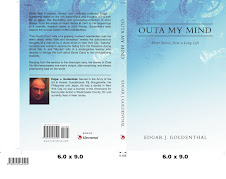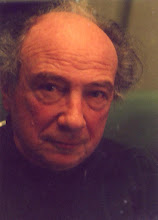In the short story “True Witness” in the book of short stories you just bought, there is a character, Asninka, who writes poetry and poison-pen letters: just as I do! She wrote a poem, “What does God Know” which I subsequently translated into Yiddish. AND, I also translated into Yiddish the poem, “ Born Again and Again” from my book of poetry, “Lots of Questions.”
In the presence of so many requests for the translation of these two poems into Yiddish (which I wrote) I have enclosed these poems with “an explanation.”
I wrote a book, published in 1998, entitled, “Poet of the Ghetto.” It was a biography of my maternal grandfather, Morris Rosenfeld, who was a noted poet. Writing that book involved learning enough Yiddish to translate a substantial number of his poems from Yiddish to English. I used the services of Rifke Levine, which I was proud to accept. Also, I used the dictionary of Alexander Harkavy who admired Rosenfeld as the first of the classical poets who wrote in Yiddish just as Morris admired Harkavy for his genius in writing the first of the Yiddish-English dictionaries.
I sought out Yadja Zeltman to aid me in writing the kind of Yiddish that was spoken in Russian-Poland in the WW II days and when I showed her the poem “Born Again” which, for some reason I had translated into Yiddish, she corrected my Yiddish, saying, “You must have been using an old, old dictionary!” I told her that I had been using Morris’ old dictionary....dated 1891!
The American poet, Walt Whitman, whom Rosenfeld had always admired as the “poet of the future” was the subject of a poem that Morris wrote and to show you how much he admired Walt I include the last two lines:
Prohfet unshtarblikhen, ikh gib dir loyb!
Ikh fall in shtoyb itzt fun dayn shtoyb, un sing!
Aaron Kramer translated that poem from the original Yiddish.
Immortal bard, I honor thee: I kneel
upon the dust, before thy dust, and sing.
Apparently Morris appreciated free verse, which was not in the classical vogue of writing poetry in the time that he wrote.
Written by Asninka in the short story, “True Witness.”
WHAT DOES GOD KNOW
What does God know?
What family does He have, to create and nourish?
to love and to cherish,
What code of honor does He follow
to reward the good
to punish the evil
to encourage the weak?
His rules are those of science,
impersonal
cold
rigid
final.
If He is but a figment of our minds
we have created a monster,
If He is indeed a being
He is without heart,
If He is in league with his twin-brother, Satan,
we have been betrayed,
If our sages have dreamed a concept that exceeds
our rationality
then we have been misled.
What does God know?
Is He our alter-ego?
Is he indeed part of us and does he share our strengths
and weaknesses?
Are we perhaps God ourselves?
Are we so weak, so impoverished, so blind,
so primitive.
Are WE then what God is all about
Is He, too, weak, impoverished, blind like Samson
and primitive?
Is He struggling to save Himself from extinction?
Nebach!
Who would be left to say Kaddish over God
as they will soon say over us?
What could Man, that weakling,
that creature of small consequence,
What could Man have done to justify the punishment
Inflicted on him,
the plagues, the wars,
rapine,
the cruelty of an uncaring universe that showers us
with fire and brimstone
with earth-jarring convulsions
with bitter cold and scorching heat?
What Father is this who treats his offspring thus?
Have we created unattainable codes for life
then punished ourselves with guilt and brutality
for having failed?
If we must converse with HIM
as we Jews have always done,
Then let us first ask:
What does GOD know about Man?
And can He care?
VOS VEYST GOT ?
(What Does God Know?)
Vos veyst Got?
Vos far a familye hot Er, tsu libn un tsu derneren?
Vos far a kohdir fon koved geyt Er nokh,
di gute tsu baloynen,
di shlekhte tsu bashtrofn,
di shvakhe khoyshik makhn?
Zayne klolim zaynen di fon visnshaft,
Umpersenlekh
kalt,
shver,
der sof.
Oyb iz Er gor an oyskler fon unzer meynungen,
hobn mir a monkalb geshafn,
Oyb Er iz a briye, iz Er gor un a harts,
Oyb Er iz bekhavruse mit zayn tsviling-brider,
dem Sotn, hot Er undz farratn,
Oyb unsere khakhomim hobn a museg oysgetrakht
vos iz gresser vi unzer seykhl,
zaynen mir dan farfirt.
Vos veyst Got?
Efsher iz Er undzer mehane-ego?
Iz Er take a khelek fon unds, un
efsher teylt Er undzer shtarkeyt un shvakhkeyt?
Efshe zaynen mir Got alleyn?
Zaynen mir azoy shvakh, azoy faroremt, azoy blind,
azoy primitif ?
Zaynen mir, dan, vos iz Got, vos Er batayt?
Iz Er oykhet shvakh, oykhet faroremt, oykhet blind un
primitif vi shimshon?
Kempft Er zikh tsu farhitn zikh fun farnikhtung?
Nebakh.
Ver vet shoyn doh blaybn kadish tsu zogn iber Got,
vi zey vern bald zogn iber uns?
Vos ken der benodem, dos shvakhinger, die brie fon
kleyner konsekvenz,
vos hot ehr geton far ale oyneshen zu kasherten,
di mageyfn,
di kamfn,
di shendung,
dos akhzoyres fon a glaykhgiltiger velt vos hot unds
mit fayer un krankhayt bashpritst,
mit erd-soyserdike convulsyes,,
mit biter kalte un farsarferte hitsn?
Vos far a Tateh iz dos,
ver bahandlt azoy Zayne kinder?
Hobn mir geshafn umderkhgraykhbare kodn far lebn
un dan mit shuld un brutalitet zikh bashtofn
ven mir hobn nit gezigt?
Oyb mir muzn mit Im redn,
vi mir Yidn hobn tomed geton,
dan zoln mir ersht fregn:
"Vos veyst Got fon menschen,
un vos art es Im?"
THE MESSIAH
For thousands of years scholars have discussed and debated the meaning of certain passages in Isaiah. So we are in good company if we interpret and discuss that noted prophet who was so influential in our history.
Early in his career Isaiah expressed the belief that the Messiah was not a single man at all. The Messiah was not a matter of one great personality but, instead, a matter of the Hebrew people, chosen and anointed by God, who would represent His beliefs and bring them to the world: to bring the Ten Commandments, the Golden Rule, the belief in only one deity to all of mankind. And then, when all of humanity finally believes as these people believed---peace and security and a humane world would exist. No people prior to Israel had the idea of a Messiah.
Also, the concept of resurrection was originally a primitive, a sort of pagan notion. It was a form of tribal wishful thinking that a great leader, some beloved individual, would come back from the dead. Would he be young and vigorous as he once was, or old and gray? Would he still have diabetes or clogged arteries? Would he have the wounds of battle or crucifixion when he returned? Would he wear the clothes of his era or shrouds, or be naked? These are questions that tax one's credulity. But the concept of a tiny nation, that feels itself chosen to fight for the world and to suffer interminably just to bring a message to the world---that was the early idea of Isaiah. This concept does not tax one's credulity. It was an idea, however, that later was changed many times, by Ezekiel and Jeremiah and others through the centuries.
It became an idea to some, then, of a man returning to life after death and it has challenged our common sense for thousands of years, requiring a vast suspension of reason and the acceptance of a deep faith that not all are capable of achieving. However, to conceive of a people being Messianic, a group that can be virtually destroyed time and time again and just a few remnants retain the capability of rising again and again to resurrect the original entity; that not only does not defy reason: it is actual historic fact!
This idea I have put into poetic form. This concept brings to mind those tiny birthday candles whose flames will not be permanently extinguished. Blow on them and the flames vanish for a moment, but an inner spark lies somewhere in those candles and before you can think about it the flames are bright and full again. Blow out those flames time and again and they are resurrected, as if by magic!
Written by Ed for the book of poetry, “Lots Of Questions”
BORN AGAIN AND AGAIN AND AGAIN
Born again, are you,
Messiah?
Your name is Israel--
slain by Philistines in every century
pillaged, burned, reduced to bones
and smoke,
Yet here you are!
Here, before my eyes,
numbers on your arms as though we
had to count ourselves
to be certain we had survived!
Isaiah knew! He called you by name
and drew the picture of you:
congealed blood, matted hair,
men screaming like children
torn from their mothers' arms.
Boundless cruelty has driven you
into a pen of horror.
Yet here you are! Still loved
Still hated
Still envied
Still misunderstood.
To bring a Law to savages?
To bring a Spark to light the world?
To hack a Path for humanity?
Is this why you are here?
Do you know, yourself, your reason
for survival?
Do you simply care in an animal way?
Do you care as a Jew, anymore,
Messiah?
VIEDER GEBOREN UND VIEDER UND VIEDER
Vieder geboren, bist du,
Mashiakh?
Du hayst Yisroyayl,
bey di Filoshtim derharget
in yeyder yorhundert,
faroyvent, farbrent, farminert tsu di bayner
un der roykh
Nokh altz bist du doh,
doh far meyne oygen,
di numeren oyf deyne orems,
azoy vi mir hobn zikh opgetseylt
tsu zayen zikher as mir ho0bn ibergelaybt.
Isaiah hut es gevust,
Er hut dir by dayn nomen gerufen,
er hut far dir a bild gemeldet,
fargliverte blut, farflokhtene hohr, mener shreyen
vi kinder fopn zayer muters hent gerisn,
onendike akhtsyores hut dir fartribn
in a shtib fon groyl areyn.
Uber du bist nokh doh,
nokh altz balibt,
nokh altz farhast,
nokh altz umfarshtanden.
A din tsu valdmenshen tsu bringen?
A foonk tsu makhen likhtig di velt?
A vayzn tsu shlogn far mensh-heyt?
Far dos bistu doh?
Vaystu, zikh alayn, deyn flikht
far iberlaybung?
Zorgst du bloyz vi a chaiah?
Zorgst du vi a Yid, mehle?
Mashiakh?
Sunday, June 15, 2008
Subscribe to:
Post Comments (Atom)


No comments:
Post a Comment